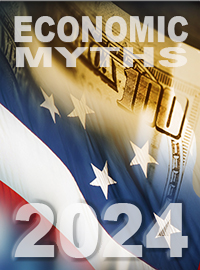| Three Economic Myths to Put To Rest This Year |
 |
|
By Veronique de Rugy
Thursday, January 04 2024 |
As a new year dawns, it's customary to reflect on the past and set resolutions for the future. This year, let's resolve to greet three widespread claims with healthy doses of skepticism. The first dubious claim is that income inequality in the United States has inexorably risen since the 1960s. It's a scary narrative heavily bolstered by the work of three French economists: Thomas Piketty, Emmanuel Saez and Gabriel Zucman. According to these researchers, the situation was fueled mostly by tax cuts for top income earners during the Reagan administration. Their proposed remedy, not surprisingly, is a sky-high, French-like level of taxation. As appealing as that may be to the many fans of soak-the-rich policies, I advise against condemning the rich to the tax guillotine quite yet. We should also hold off on trying to tackle the alleged problem with more welfare spending. In the last few years, a series of peer-reviewed studies from very respectable economists have shown that the three Frenchmen's claims of rising income inequality suffer from fatal flaws. For instance, some researchers argue that the rise in inequality is not as pronounced as suggested, pointing to better data sources or interpretations. Others highlight methodological issues, such as the questionable treatment of tax data and government transfers in calculating incomes. Basically, the incessant narrative of ever-widening income inequality requires, at a minimum, serious skepticism. That leaves the case for further income redistribution weak, even if one admits that welfare spending has increased the income of some poverty-stricken Americans. Unfortunately, it's done so at the cost of economy-wide productivity and sometimes to the detriment of welfare recipients themselves. Short of adopting this more accurate and comprehensive picture of American wealth distribution and economic mobility, I hope we will at least hear more tempered claims from the Left that the world is going to hell. The second claim warranting skepticism is the one about how years of unchecked globalization have eroded America's industrial foundation. Not only do we Americans still produce an enormous economic output, but the U.S. also continues to be a dominant force in manufacturing. A recent paper by the Cato Institute's Colin Grabow even reports that American manufacturing surpasses the output of Japan, Germany and South Korea combined. We are the world's second-largest manufacturing economy and, better yet, we are a global frontrunner in critical sectors such as automotive and aerospace. Further, I hope people finally come to understand that the fact that manufacturing now employs fewer workers and contributes less to gross domestic product than in previous decades doesn't require a change in policy. As Grabow shows, the same thing is happening across all developed countries -- and not predominantly due to globalization. It's more a result of advances in productivity (as workers use more machines and computers, they produce more output) and a change in consumer preferences toward services rather than goods. Besides, while fewer people are employed in manufacturing, those who continue to work there enjoy better and safer work conditions. They also command higher wages. If you're unconvinced of these points, go visit a modern steel mill. Finally, I wish politicians and pundits – and more of us citizens – would become a lot more skeptical about the idea that government is the solution to all problems. At the very least, I hope they consider the sheer scale of today's government. Despite all the enormous spending and extensive regulating, dissatisfaction among the public persists, and in many cases, problems seem to be worsening. Correlation isn't causation, but this observation alone should puzzle those who believe that simply expanding government is a solution. In truth, government spending is not inherently efficient or effective. It often leads to a misallocation of resources, bureaucratic inefficiencies and unintended consequences that exacerbate the problems government aims to solve. And when government fails, its mistakes are hard to correct. It's a sharp contrast with the dynamic and adaptive nature of free markets. The collective decisions of millions of individuals freely spending and investing their own money are incredibly effective at allocating resources, responding to consumer needs and driving innovation. And when the market fails, people with their own money on the line don't hesitate to change course. As we step into 2024, it's crucial to adopt a better and informed perspective toward these and other prevalent claims. The narrative of ever-increasing income inequality, the supposed erosion of America's industrial base due to globalization and the belief in government as a panacea are all areas ripe for reevaluation. Veronique de Rugy is the George Gibbs Chair in Political Economy and a senior research fellow at the Mercatus Center at George Mason University. COPYRIGHT 2024 CREATORS.COM |
Related Articles : |
























